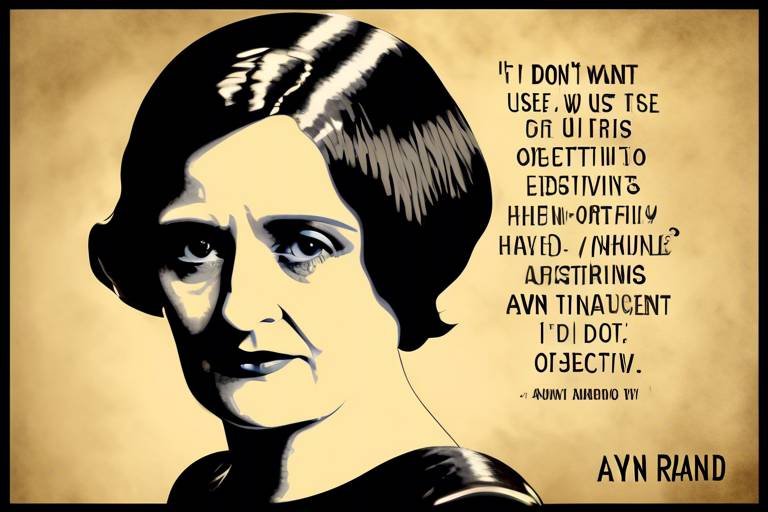Ayn Rand and the Philosophy of Self-Interest
Ayn Rand, a towering figure in 20th-century philosophy, introduced a radical perspective on self-interest that has sparked both admiration and controversy. Her philosophy, often summarized as Objectivism, posits that self-interest is not only a natural human trait but also a moral imperative. In a world where altruism is often hailed as the highest virtue, Rand's ideas challenge us to reconsider the role of the individual in society. By placing the individual at the center of moral and economic discussions, she advocates for a framework where personal happiness and rationality are paramount. This article explores the foundational principles of Rand's philosophy, its implications for individualism and capitalism, and its relevance in today's complex world.
Understanding self-interest as a driving force in human behavior is crucial to grasping Rand's philosophy. For Rand, self-interest is not synonymous with selfishness in the pejorative sense; rather, it embodies a rational pursuit of one’s own happiness. This pursuit is grounded in the belief that individuals are best equipped to determine their own needs and desires. Rand's emphasis on rationality means that self-interest must be informed by reason and knowledge, rather than mere whim or impulse. She argues that when individuals act in their own self-interest, they not only achieve personal fulfillment but also contribute positively to society as a whole.
Rational egoism is a cornerstone of Rand's philosophy. It asserts that acting in one’s self-interest, when guided by reason, leads to ethical behavior. Unlike hedonism, which often promotes immediate gratification, rational egoism emphasizes long-term goals and the pursuit of values that sustain one’s life and happiness. Rand believed that individuals should engage in the pursuit of their own rational self-interest, which includes the pursuit of knowledge, creativity, and productive work. This approach not only benefits the individual but also enhances society by fostering innovation and progress.
Rand's rejection of altruism is pivotal to her philosophy. She argues that altruism, which often demands self-sacrifice for the sake of others, conflicts with the very essence of human nature. In her view, true morality is rooted in the pursuit of one’s own happiness, and any ideology that prioritizes the needs of others above one’s own is fundamentally flawed. This perspective raises a compelling question: can we truly help others if we neglect our own well-being? Rand contends that by embracing self-interest, individuals are better positioned to contribute to the welfare of others, as they are not depleted by self-sacrifice.
Examining the impact of altruism on society reveals a troubling pattern. Rand believed that altruistic practices undermine individual achievement and freedom, leading to societal stagnation. When individuals are conditioned to prioritize the needs of others over their own, it diminishes their drive to innovate and excel. This can result in a culture that rewards mediocrity and punishes success, ultimately stifling progress. As a counterpoint, Rand advocates for a society that celebrates personal achievement and recognizes that the flourishing of individuals contributes to the overall prosperity of the community.
Embracing self-interest has numerous positive outcomes. Rand argues that when individuals pursue their own goals and aspirations, they foster innovation, productivity, and personal fulfillment. This, in turn, leads to a thriving society where creativity and progress are celebrated. By prioritizing self-interest, individuals can contribute to a dynamic economy and a vibrant culture. Rand's philosophy encourages us to view self-interest not as a vice but as a vital force for good that drives human advancement.
Individualism is central to Rand's philosophy. She posits that self-interest aligns with individual rights and freedoms, advocating for a society where personal achievement is celebrated and protected. In Rand's view, each person is an end in themselves, with the right to pursue their own happiness and success. This emphasis on individual rights challenges collectivist ideologies that seek to subordinate the individual to the group. By championing individualism, Rand underscores the importance of personal responsibility and the belief that individuals should be free to act according to their own rational self-interest.
Rand's philosophy has profound implications for capitalism. She argues that her views on self-interest and individualism support a free-market economy, where competition and innovation are essential drivers of progress. In a capitalist system, individuals are motivated by their self-interest to create, produce, and trade, resulting in a more efficient allocation of resources. Rand believed that capitalism, when grounded in the principles of rational self-interest, leads to moral outcomes that benefit all individuals, as it encourages cooperation and mutual benefit.
Examining the ethical dimensions of capitalism from Rand's perspective reveals a framework where self-interest does not conflict with morality. She argues that a capitalist society, based on voluntary exchanges and mutual consent, fosters an environment where individuals can thrive. In such a system, the pursuit of one’s self-interest aligns with the well-being of others, as businesses succeed by providing value to consumers. This ethical foundation challenges the notion that capitalism is inherently exploitative, instead presenting it as a system that promotes human flourishing.
Despite its influence, Rand's philosophy faces criticism. Detractors argue that her ideas oversimplify complex social dynamics and that an unbridled pursuit of self-interest can lead to ethical dilemmas and societal harm. Critics often raise concerns about the potential for selfishness to override compassion and community values. However, proponents of Rand’s philosophy contend that a deeper understanding of self-interest reveals its potential to foster a more humane and prosperous society. The debates surrounding her ideas continue to shape contemporary discourse on ethics, individualism, and the role of government in economic affairs.
- What is the main idea of Ayn Rand's philosophy?
Ayn Rand's philosophy, known as Objectivism, centers on the belief that rational self-interest and individualism are fundamental to human flourishing. - How does Rand differentiate self-interest from selfishness?
Rand argues that self-interest is a rational pursuit of one’s happiness, while selfishness, in a negative sense, involves harming others to achieve one's goals. - What are the implications of her philosophy for capitalism?
Rand's views support a capitalist system where self-interest drives innovation and economic growth, promoting individual rights and freedoms.

The Essence of Self-Interest
Understanding self-interest as a driving force in human behavior is crucial to grasping the essence of Ayn Rand's philosophy. At its core, Rand defines self-interest not merely as a pursuit of personal gain but as a fundamental aspect of human nature that drives individuals to seek their own happiness and well-being. This perspective is rooted in the idea that rationality and personal fulfillment are essential components of a meaningful life.
In Rand's view, self-interest is synonymous with rationality. It is about making choices that align with one’s values and long-term goals, rather than succumbing to fleeting desires or societal pressures. This distinction is vital, as it separates her philosophy from mere hedonism, which often prioritizes short-term pleasure over lasting satisfaction. Instead, Rand champions a more profound understanding of happiness that emerges from pursuing one’s passions, ambitions, and personal achievements.
Moreover, self-interest is not an isolated endeavor; it plays a significant role in interpersonal relationships and societal structures. When individuals act in their self-interest, they often contribute positively to the community around them. This is because, through their own pursuits, they create value, foster innovation, and promote progress. In this light, self-interest becomes a catalyst for collective advancement, challenging the notion that pursuing one's happiness is inherently selfish.
To illustrate, consider the following points about self-interest:
- Self-Discovery: Engaging in self-interest encourages individuals to explore their passions and talents, leading to personal growth and self-awareness.
- Value Creation: When individuals follow their interests, they contribute to the economy and society by creating products, services, and innovations that benefit others.
- Mutual Benefit: Pursuing one's self-interest can lead to collaborations and relationships that are mutually beneficial, reinforcing the idea that individual success can enhance collective well-being.
Ultimately, the essence of self-interest in Rand's philosophy is about embracing one’s own happiness as a moral imperative. It is a call to recognize that when individuals prioritize their rational self-interest, they are not only enriching their own lives but also contributing to a more vibrant and dynamic society. This philosophy challenges us to reconsider our perspectives on ethics and morality, urging us to see self-interest as a powerful force for good rather than a source of conflict.

Rational Egoism Explained
At the heart of Ayn Rand's philosophy lies the concept of rational egoism, a principle that distinguishes her views from mere self-indulgence or hedonism. To understand rational egoism, we must first recognize that it is not about pursuing pleasure at the expense of others; rather, it is about making choices that are in alignment with one's long-term goals and values. This approach emphasizes the importance of reason and rational thought in guiding our actions, ensuring that our decisions contribute to our overall well-being and happiness.
Rational egoism posits that individuals should act in their own self-interest, but this self-interest must be informed by reason. Unlike hedonism, which often prioritizes immediate gratification, rational egoism encourages individuals to consider the broader implications of their actions. It promotes the idea that true happiness is achieved through the pursuit of meaningful goals rather than fleeting pleasures. For example, choosing to invest time in education or personal development may not yield immediate rewards, but it aligns with a rational understanding of one's long-term aspirations.
To illustrate this further, consider the following table that outlines the key differences between rational egoism and hedonism:
| Aspect | Rational Egoism | Hedonism |
|---|---|---|
| Focus | Long-term self-interest | Immediate pleasure |
| Decision-making | Based on reason and values | Based on feelings and desires |
| Outcome | Personal fulfillment and growth | Temporary satisfaction |
By embracing rational egoism, individuals acknowledge that their well-being is interconnected with the well-being of others, but this does not mean sacrificing their own interests. Instead, it fosters a society where collaboration and mutual benefit can thrive. When people pursue their own rational self-interest, they often create value for others, leading to a more prosperous and innovative community.
In this light, rational egoism serves as a guide for ethical behavior. It suggests that individuals have a moral obligation to pursue their own happiness, as this pursuit does not inherently conflict with the happiness of others. In fact, it can enhance it. This perspective shifts the narrative from one of competition and scarcity to one of cooperation and abundance, where everyone has the opportunity to flourish.
Ultimately, rational egoism is a celebration of individual potential. It champions the idea that each person is capable of making choices that enhance their lives and contribute to society. By prioritizing reason, individuals can navigate the complexities of life in a way that aligns with their true values, leading to a more fulfilling existence.
- What is the main difference between rational egoism and altruism?
Rational egoism focuses on pursuing one's own self-interest through reason, while altruism prioritizes the well-being of others, often at the expense of oneself. - Can rational egoism lead to a better society?
Yes, when individuals pursue their own rational self-interest, they often create opportunities and innovations that benefit society as a whole. - Is rational egoism the same as selfishness?
No, rational egoism is about making informed choices that lead to long-term happiness, while selfishness may involve disregarding the needs and rights of others.

Self-Interest vs. Altruism
When we dive into the philosophical waters of self-interest and altruism, we encounter a fascinating tug-of-war that has shaped ethical discussions for centuries. At the heart of Ayn Rand's philosophy lies a bold assertion: true morality is not about sacrificing oneself for others, but rather about pursuing one's own happiness and well-being. This perspective challenges the traditional view that altruism—acting selflessly for the benefit of others—is the highest moral standard. But what does this really mean for us as individuals and as a society?
Rand argues that the concept of altruism, while often celebrated, can lead to a dangerous precedent. By prioritizing the needs of others above our own, we risk neglecting our personal goals and happiness. This is not to say that helping others is inherently wrong; rather, Rand suggests that any act of kindness should stem from a place of genuine self-interest. In her view, when individuals act in their own best interest, they contribute positively to society.
To further illustrate this point, consider the following:
- Self-Interest Fuels Innovation: When individuals pursue their passions and interests, they often create groundbreaking ideas and innovations that benefit everyone.
- Altruism Can Lead to Resentment: Constantly putting others first may lead to feelings of frustration and resentment, ultimately harming relationships.
- Mutual Benefit: In a society where self-interest is embraced, individuals can engage in mutually beneficial exchanges, fostering a sense of community without sacrificing their own needs.
Moreover, Rand's rejection of altruism is not merely a personal preference; it has profound implications for how we view societal structures. If we accept that self-interest is a natural and essential part of human behavior, we can begin to understand why a society that celebrates individual achievement tends to thrive. By aligning personal goals with societal progress, we create an environment where everyone can flourish.
In essence, the clash between self-interest and altruism isn't just about individual choices; it's about the very fabric of our society. Are we to be a culture that promotes self-sacrifice at the expense of personal happiness, or one that champions the idea that our own success can lead to the betterment of all? Rand's philosophy boldly advocates for the latter, urging us to recognize that our pursuit of happiness is not only valid but essential for a vibrant, innovative society.
So, the next time you ponder your decisions—whether to put yourself first or to prioritize others—consider the broader implications of your choice. Embracing self-interest doesn't mean forsaking kindness; it means understanding that your happiness can be the catalyst for positive change in the world around you.
1. What is the main difference between self-interest and altruism?
Self-interest focuses on pursuing one's own happiness and goals, while altruism emphasizes self-sacrifice for the benefit of others. Rand argues that true morality lies in self-interest.
2. Can self-interest lead to positive societal outcomes?
Yes, Rand believes that when individuals pursue their own interests, they contribute to innovation and overall societal progress, creating a win-win situation for everyone.
3. Is altruism inherently bad?
Rand does not claim that altruism is bad in all cases, but she warns against its potential to undermine individual achievement and personal happiness.
4. How does Rand's philosophy apply to modern capitalism?
Rand's philosophy supports a capitalist system where self-interest drives competition and innovation, ultimately benefiting society as a whole.

Consequences of Altruism
When we delve into the concept of altruism, we often find ourselves wrapped up in the noble idea of selflessness and the desire to help others. However, as Ayn Rand argues, this seemingly virtuous path can lead to significant consequences that undermine individual achievement and personal freedom. One of the most striking aspects of altruism is its tendency to promote a culture where self-sacrifice is celebrated, potentially at the expense of one's own happiness and success.
Rand posits that altruism, while appearing benevolent, can create a societal framework that discourages personal ambition and innovation. When individuals are constantly encouraged to place the needs of others above their own, it can lead to a paradox: the very act of selflessness may result in a stagnation of personal and societal progress. This is because, in a system that prioritizes altruism, the achievements of individuals are often overshadowed by the collective needs of the group, leading to a culture that values mediocrity over excellence.
Additionally, the consequences of altruism can manifest in various ways:
- Dependency: A society that promotes altruistic behavior often fosters dependency among its members. When individuals rely on the goodwill of others, it diminishes their drive to achieve personal goals.
- Resentment: Those who consistently sacrifice their own interests for others may eventually feel resentment, leading to a breakdown in relationships and community spirit.
- Stagnation: As innovation and personal initiative are stifled, society as a whole may experience stagnation, preventing progress and advancement.
Rand's critique of altruism is not just an academic exercise; it has real-world implications. In many ways, she argues that the glorification of altruistic acts can lead to a culture where individuals feel guilty for pursuing their own happiness. This guilt can manifest in various ways, from career choices to personal relationships, ultimately creating a cycle of self-neglect.
Moreover, altruism can lead to the erosion of personal responsibility. When individuals are taught that they must always prioritize the needs of others, it can create a sense of entitlement among those who expect help without contributing to the greater good. This expectation can further exacerbate societal issues, such as poverty and inequality, as it discourages personal initiative and hard work.
In conclusion, while altruism may be rooted in the desire to create a better world, its consequences can be detrimental to both individuals and society. By advocating for a philosophy that embraces self-interest, Rand encourages us to recognize that true morality lies in the pursuit of our own happiness. This, in turn, allows for a more vibrant, innovative, and prosperous society where personal achievement is celebrated rather than stifled.
Q1: What is the main argument against altruism according to Ayn Rand?
Ayn Rand argues that altruism undermines individual achievement and personal freedom by promoting self-sacrifice over self-interest, which can lead to societal stagnation.
Q2: How does altruism create dependency in society?
Altruism can foster a culture of dependency where individuals rely on the goodwill of others, diminishing their motivation to pursue personal goals and achievements.
Q3: What are the potential negative outcomes of prioritizing altruism?
Prioritizing altruism can lead to resentment among those who sacrifice their own needs, as well as a lack of innovation and progress in society.
Q4: How does Rand's philosophy propose to address the issues caused by altruism?
Rand's philosophy advocates for self-interest, suggesting that by pursuing one's own happiness, individuals contribute to a more prosperous and innovative society.

Embracing Self-Interest
Embracing self-interest is not just a philosophical stance; it’s a powerful catalyst for personal and societal progress. When we talk about self-interest, we’re not advocating for a selfish, cutthroat mentality. Instead, we’re emphasizing a rational approach to pursuing one’s goals and happiness. Think of it as nurturing a garden: when you tend to your own plants, they flourish, and in turn, they contribute beauty and sustenance to the world around you.
By prioritizing self-interest, individuals become more innovative and productive. When people are encouraged to pursue their passions and interests, they naturally contribute to society in meaningful ways. For instance, consider an artist who dedicates their time to creating a masterpiece. Their self-interest in producing art not only fulfills their own creative desires but also enriches the cultural landscape for everyone. In this way, embracing self-interest catalyzes a cycle of innovation and fulfillment.
Moreover, self-interest fosters personal fulfillment, which is essential for a thriving society. When individuals focus on their own happiness and well-being, they are more likely to engage positively with others. It’s like the concept of paying it forward; when you take care of yourself, you are in a better position to help others. This doesn’t mean neglecting the needs of our community; rather, it highlights the idea that a happy, fulfilled person is more capable of making a positive impact.
Let’s break down some of the benefits of embracing self-interest:
- Increased Motivation: When individuals focus on their own goals, they are more motivated to achieve them, leading to greater productivity.
- Enhanced Creativity: Self-interest encourages people to think outside the box and innovate, as they pursue what truly excites them.
- Stronger Communities: As individuals thrive, they contribute to their communities, creating a ripple effect of positivity and support.
In a world where self-interest is often misconstrued as selfishness, it’s crucial to redefine and embrace it as a force for good. The more we recognize that our personal happiness and success can lead to collective prosperity, the more we can foster an environment where everyone can thrive. This philosophy not only aligns with Ayn Rand's principles but also resonates deeply in today’s fast-paced, competitive society.
Ultimately, embracing self-interest is about recognizing that when we pursue our own happiness and goals, we are not just looking out for ourselves; we are contributing to a greater good. It’s a profound realization that can transform our approach to life, work, and relationships. So, let’s celebrate self-interest as a driving force for innovation, fulfillment, and a vibrant society.
Q: Is self-interest synonymous with selfishness?
A: No, self-interest is about pursuing personal happiness and goals rationally, while selfishness often disregards others' needs. Embracing self-interest can lead to positive outcomes for both the individual and society.
Q: How does self-interest contribute to societal progress?
A: When individuals pursue their passions and interests, they innovate and create value, which benefits society as a whole. A society that encourages self-interest fosters creativity and productivity.
Q: Can embracing self-interest lead to a more ethical society?
A: Yes, by aligning personal goals with ethical behavior, individuals can contribute positively to society. Rand argued that self-interest, when pursued rationally, leads to moral outcomes that benefit everyone.

The Role of Individualism
Individualism is not just a concept; it's the very heartbeat of Ayn Rand's philosophy. At its core, individualism champions the idea that each person is a unique entity, endowed with their own thoughts, desires, and potential. Rand argues that this uniqueness is not only to be celebrated but also protected. In a world where conformity often reigns, individualism serves as a beacon, urging us to embrace our personal journeys and aspirations. But why is this so crucial? Well, when individuals are free to pursue their own interests and goals, they contribute to society in ways that are both innovative and transformative.
Imagine a society where everyone is encouraged to think for themselves, where creativity and personal expression flourish. This is the ideal that Rand envisions. She posits that when individuals act in their own self-interest, they inadvertently benefit others. It’s a bit like a well-tuned orchestra; every musician plays their part, and together, they create a symphony. In this analogy, each individual represents a unique instrument, contributing to the richness of the collective experience. Rand’s philosophy insists that when individuals are free to pursue their passions, they not only achieve personal fulfillment but also push the boundaries of what is possible for society as a whole.
Moreover, individualism aligns perfectly with the concept of individual rights. Rand asserts that each person has the right to their own life, liberty, and the pursuit of happiness. This fundamental belief lays the groundwork for a society where personal achievement is not just accepted but celebrated. In such a society, the government’s role is to protect these rights, ensuring that individuals are free to act on their own behalf without coercion or interference. This protection of individual rights is essential for fostering an environment where innovation and progress can thrive.
However, embracing individualism does not mean ignoring the social fabric that connects us. Rand acknowledges that while individuals pursue their self-interest, they also engage in voluntary interactions with others. These interactions can lead to mutually beneficial relationships, where cooperation and collaboration occur naturally. It’s important to note that Rand’s individualism promotes a society where people choose to work together based on shared interests and goals, rather than being forced into collectivism. This voluntary cooperation is what makes individualism not just a personal philosophy, but a pathway to a thriving, dynamic society.
In summary, individualism is a cornerstone of Rand's philosophy, emphasizing the importance of personal freedom, rights, and the pursuit of happiness. By fostering an environment where individuals can thrive, we create a society that is not only productive but also rich in creativity and innovation. So, the next time you think about the role of individualism, remember that it’s about more than just self-interest; it’s about creating a world where each person can shine in their unique way.
- What is individualism according to Ayn Rand? Individualism, in Rand's philosophy, is the belief that each person is a unique entity with the right to pursue their own happiness and goals.
- How does individualism contribute to society? By allowing individuals to pursue their self-interest, individualism fosters innovation and creativity, benefiting society as a whole.
- What is the relationship between individualism and capitalism? Rand argues that individualism supports capitalism by promoting individual rights and freedom, which are essential for a free-market economy.

The Impact on Capitalism
When we talk about capitalism, it's hard to ignore the profound influence of Ayn Rand's philosophy on this economic system. Rand's emphasis on self-interest and individualism serves as a robust foundation for understanding how capitalism operates. At its core, capitalism thrives on the idea that individuals pursuing their own interests can lead to collective benefits. This is not just a theoretical concept; it is a practical reality that has shaped economies around the world.
Rand believed that the pursuit of self-interest is the engine of progress. In a capitalist society, when individuals are free to pursue their own goals, they innovate, create, and contribute to the economy in ways that benefit everyone. Think of it like a garden: when each plant is allowed to grow towards the sun, the entire garden flourishes. This metaphor illustrates how personal ambition, when aligned with a free market, can lead to a thriving society.
Moreover, Rand's philosophy argues that competition is not only natural but necessary for a healthy economy. It drives innovation and efficiency, pushing individuals and businesses to improve continuously. The freedom to compete means that companies must constantly strive to offer better products and services, which ultimately benefits consumers. This dynamic is akin to a race; the more competitors there are, the faster and more innovative the outcomes tend to be.
However, it’s essential to recognize that Rand's vision of capitalism is not merely about profit maximization. It's about the ethical implications of a system where individuals are free to act in their own self-interest, as long as they do not infringe on the rights of others. This principle is crucial, as it lays the groundwork for a moral capitalist society. In Rand's view, capitalism is the only system that respects individual rights, allowing people to pursue their happiness without coercion.
| Key Principles of Rand's Capitalism | Description |
|---|---|
| Self-Interest | The motivation behind individual actions that lead to personal and societal benefits. |
| Individual Rights | The protection of each person's freedom to pursue their own path without interference. |
| Competition | The driving force that fosters innovation and efficiency in the market. |
| Moral Outcomes | The belief that a capitalist society based on self-interest leads to ethical benefits for all. |
Critics often argue that capitalism can lead to inequality and exploitation, but Rand would counter that the solution lies not in undermining self-interest, but in ensuring that the system operates fairly and justly. She believed that when individuals are free to pursue their goals, they naturally uplift others in the process, creating a more prosperous society overall.
In summary, Rand’s philosophy offers a compelling lens through which to view capitalism. It posits that when individuals are allowed to act in their own self-interest, the entire society benefits. This perspective not only champions the virtues of personal ambition but also underscores the importance of a system that protects individual rights. As we navigate the complexities of modern economies, Rand's insights remain relevant, challenging us to rethink the relationship between self-interest and the greater good.

Ethics of Capitalism
The ethics of capitalism, as envisioned by Ayn Rand, is a fascinating topic that intertwines morality with economic freedom. Rand argues that capitalism is not just an economic system; it is fundamentally a moral framework that respects individual rights and promotes human flourishing. In her view, the ethical foundation of capitalism lies in the principle of self-interest, which she sees as the driving force behind innovation, productivity, and overall societal progress. But what does that actually mean for us as individuals and as a society?
At its core, Rand's philosophy posits that when individuals pursue their own self-interest, they inadvertently contribute to the greater good. This is because, in a capitalist society, people are motivated to create products and services that others value. Think of it this way: when you buy your favorite gadget, you are not just fulfilling your desire; you are also supporting the engineers, designers, and manufacturers who worked tirelessly to bring that product to life. In this sense, capitalism operates on a mutual benefit principle, where personal gain aligns with communal progress.
Moreover, Rand emphasizes the importance of voluntary exchange in a capitalist system. This means that transactions occur not under coercion but through mutual consent. When individuals engage in trade, they do so because they believe it will enhance their lives. This voluntary nature of capitalism fosters a sense of responsibility and accountability among individuals. Unlike systems that rely on force or coercion, capitalism encourages people to act ethically by ensuring that their actions will have direct consequences on their success and reputation.
However, critics often argue that capitalism can lead to exploitation and inequality. They contend that the pursuit of self-interest can overshadow moral considerations, leading to a society where the wealthy thrive at the expense of the poor. Rand would counter this by asserting that true capitalism does not allow for exploitation. In her view, exploitation occurs in systems where individual rights are not protected, such as in collectivist societies. She argues that a capitalist system, grounded in the respect for individual rights, creates a level playing field where everyone has the opportunity to succeed based on their abilities and efforts.
To illustrate this point, consider the following table that summarizes Rand’s perspective on the ethical implications of capitalism versus collectivism:
| Aspect | Capitalism | Collectivism |
|---|---|---|
| Individual Rights | Protected and celebrated | Subordinated to the group |
| Motivation | Self-interest drives innovation | Conformity and compliance |
| Economic Freedom | Voluntary exchange | Government control |
| Outcome | Mutual benefit and progress | Stagnation and resentment |
In conclusion, Rand’s ethical framework for capitalism is rooted in the belief that the pursuit of self-interest is not only natural but also essential for a thriving society. By embracing self-interest within a capitalist context, individuals can achieve personal fulfillment while simultaneously contributing to the collective well-being of society. This dual benefit is what makes capitalism, in Rand's eyes, the most ethical economic system available.
- What is the main principle of Rand's ethics of capitalism?
Rand's main principle is that self-interest drives individuals to create value, benefiting society as a whole through voluntary exchange.
- How does Rand view altruism in relation to capitalism?
Rand rejects altruism as a moral ideal, arguing that it can undermine individual achievement and freedom, which are essential for a prosperous society.
- Can capitalism lead to inequality?
While critics argue that capitalism can create inequality, Rand contends that true capitalism protects individual rights and provides equal opportunities for success.

Critiques and Controversies
Ayn Rand's philosophy of self-interest has stirred significant debate and controversy since its inception. While many admire her bold advocacy for individualism and capitalism, others vehemently critique her ideas as overly simplistic or even dangerous. One of the primary critiques centers on her rejection of altruism. Critics argue that by dismissing altruistic behaviors, Rand promotes a form of selfishness that could lead to societal fragmentation. They assert that a society driven solely by self-interest may neglect the needs of the vulnerable, fostering inequality and resentment.
Moreover, opponents claim that Rand's philosophy fails to account for the complexities of human relationships. They argue that not all interactions can be reduced to transactional exchanges of self-interest. This perspective suggests that empathy, cooperation, and collective responsibility are essential for a functioning society. Critics often cite examples from history where extreme individualism has led to social unrest, asserting that Rand's ideals might inadvertently encourage a lack of social cohesion.
Additionally, some economists challenge Rand's views on capitalism. They argue that her ideal of a completely free market overlooks the potential for monopolies and corporate malfeasance. Critics contend that unchecked self-interest can lead to practices that harm consumers and the environment. They advocate for a balance between individual rights and regulatory measures to ensure fair competition and protect the public good.
Despite these critiques, Rand's philosophy continues to resonate with many, particularly in libertarian circles. Supporters argue that her emphasis on personal responsibility and rational self-interest is not only morally sound but also essential for innovation and progress. They believe that when individuals pursue their own happiness, they inadvertently contribute to the greater good, as successful individuals often create jobs and drive economic growth.
To better understand the ongoing discussions surrounding Rand's philosophy, it’s useful to consider the following points:
- Altruism vs. Self-Interest: The debate often hinges on whether self-interest can coexist with altruistic behavior.
- Individualism vs. Collectivism: Critics argue that Rand's focus on the individual undermines the importance of community and collective welfare.
- Economic Implications: The potential downsides of a free-market system without checks and balances are a significant concern for many economists.
In conclusion, while Ayn Rand's philosophy of self-interest has undeniably influenced modern thought, it remains a polarizing topic. The critiques and controversies surrounding her ideas reflect deeper societal questions about the balance between individual rights and collective responsibilities. As we navigate these discussions, it’s crucial to consider both the merits and the shortcomings of Rand's philosophy in the context of our current societal challenges.
- What is Ayn Rand's philosophy of self-interest? Ayn Rand's philosophy, often referred to as Objectivism, posits that rational self-interest is the guiding principle of human behavior and that individuals should pursue their own happiness as their ultimate moral aim.
- How does Rand's philosophy view altruism? Rand rejects altruism, arguing that it undermines individual achievement and happiness. She believes that true morality is rooted in the pursuit of one's own interests.
- What are the implications of her philosophy for capitalism? Rand's views support a free-market economy, asserting that self-interest drives competition and innovation, which are essential for economic progress.
- What are some common critiques of Rand's ideas? Critics argue that her philosophy promotes selfishness, neglects the importance of community, and overlooks the potential negative consequences of unregulated capitalism.
Frequently Asked Questions
- What is Ayn Rand's philosophy of self-interest?
Ayn Rand's philosophy of self-interest, often referred to as rational egoism, emphasizes the importance of pursuing one's own happiness and well-being. Unlike hedonism, which focuses on immediate pleasures, Rand's approach advocates for long-term rational goals that enhance individual fulfillment and success.
- How does rational egoism differ from altruism?
Rational egoism posits that individuals should act in their own best interests, while altruism suggests self-sacrifice for the benefit of others. Rand argues that true morality stems from the pursuit of one's own happiness, asserting that altruistic ideals can impede personal achievement and freedom.
- What are the consequences of altruism according to Rand?
Rand believes that altruism can lead to societal stagnation by undermining individual initiative and creativity. She argues that when people prioritize the needs of others over their own, it diminishes personal responsibility and can hinder progress and innovation.
- Why is individualism important in Rand's philosophy?
Individualism is central to Rand's philosophy as it champions personal rights and freedoms. She contends that a society that respects and celebrates individual achievement fosters an environment where creativity and progress can thrive, ultimately benefiting everyone.
- How does Rand's philosophy impact capitalism?
Rand's views on self-interest and individualism provide a robust foundation for capitalism. She argues that a free-market economy, driven by rational self-interest, promotes competition and innovation, which are essential for societal advancement and prosperity.
- What are some common critiques of Rand's philosophy?
Critics often argue that Rand's emphasis on self-interest can lead to selfishness and a lack of compassion for others. There are debates surrounding the ethical implications of her ideas, particularly concerning societal well-being and the potential consequences of prioritizing individual gain over collective needs.



















